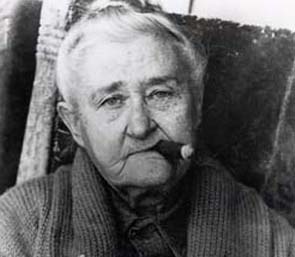I returned from Dodge City and other towns in Kansas yesterday. I had been traveling around the state promoting two books, one of which was The Bedside Book of Bad Girls: Women Outlaws of the Midwest. Outlaw Alice Ivers was one of many bad girls I had a chance to talk to readers about. Alice was born in Sudbury, Devonshire England in 1851. She immigrated with her family to the U.S., settling in Virginia first, then moving to Fort Mead, Colorado where her father was a school teacher. She married a mining engineer, who introduced her to the fast world of the gamblers and their known haunts. Ivers greatly admired the car sharps and high-hatted gamblers that traveled the cow towns and soon she learned their card-playing wiles. While in her teens, Ivers went to Deadwood, South Dakota, where she became a dealer, specializing in poker and soon earning the sobriquet “Poker Alice.” After her husband died, she devoted the rest of her life to gambling; traveling through Arizona, Oklahoma, Kansas, South Dakota, Texas, and New Mexico, or wherever the stakes were high and the whisky smooth. She smoked thick, black cigars, and during the 1870s and 1880s, became a well-known and successful gambler in all the famous cow towns, from Deadwood to Tombstone, Arizona. In her heyday, she would spend $6,000 in the fancy New York run shopping stores buying the finest garments, but later, in old age, Ivers took to wearing army surplus clothing. Poker Alice would not tolerate a cheat and was never challenged by other gamblers. She was known to carry sever guns, one in her purse and one in a pocket of her dress. On occasion, she would practice her marksmanship by shooting knobs off the frames of pictures hanging in bars to warn gambler gunmen that she was capable of defending herself. Wild Bill Hickok reportedly asked Poker Alice to sit in with him and others during the game of poker in Saloon No. 10 in Deadwood on the day he was shot by Jack McCall; she declined, saying that she had already agreed to play with another group down the street in Mann’s Saloon. When hearing that Wild Bill had been shot in the back, Ivers rushed to Saloon No. 10 and saw Hickok sprawled dead on the floor and McCall fleeing out the back door. “Poor Wild Bill,” she said of Hickok, peering down at his corpse, “he was sitting where I would have been if I had play with Wild Bill on that fateful day because she “had a queer feeling that all would not be right that day.” Alice Ivers later married Frank Tubbs, a gambler who did not possess half her playing talents and one who took to drink early in their marriage. Poker Alice was forever getting her husband out of trouble. Tubbs was knifed one night by a disgruntled player, and Poker Alice stormed into the bar and shot the man in the stomach, wounding him from a distance of thirty feet. She and Tubbs moved on to Silver City, Nevada, where she broke the bank in the biggest saloon, winning an estimated $150,000. She and Tubbs then brought a huge Colorado ranch which Poker Alice later lost. Following her husband’s death, Poker Alice moved to Rapid City, South Dakota, where she ran a small poker club. She died there, a grand old lady of western lore, on February 27, 1930. 
Follow Me
© 2024 Chris Enss | Privacy Policy | Design by Winter Street Design Group | Login

